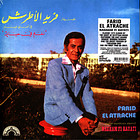A young woman larks around with her peers in the heart of Beirut. She has blonde hair, wears a designer dress, and works in a busy recording studio. A sartorial gentleman, played by Farid El Atrache, elicits melancholy tones from an oud. The Egyptian-Lebanese film »Nagham Fi Hayati« strikes us today as the faded dream of a by-gone pan-Arab liberalism. The soundtrack from the film is now being re-released for the first time in almost 50 years. Occidental forms and Arabic music flow together here. The sonic core of the whole thing is a western-style big band orchestra. Yet piano, violins and accordion strike ‘oriental’ tones. Supported by Taqsim percussion, the yearning voice of El Atraches, known as the »sad singer«, frames the arrangement. He mischievously blurs the boundaries between dance recital and mourning. After three serenades, the »King of the Oud« concludes the evening with an instrumental solo that is as rambling as it is virtuoso. He created an electrifying hermaphrodite with an inner tension that remains unbroken with »Nagham Fi Hayati«. From today’s perspective, the consistently seven to ten-minute pieces could probably have been edited. But their charm also lies in the fact that they seem to have stepped out of history. As a record of past aspirations, »Nagham Fi Hayati« suggests that the current plight in the Middle East was never without alternatives.
Various Artists
Synthesizing The Silk Roads
Ostinato


